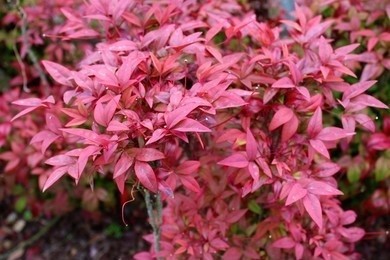Nandina Plant Tissue Culture

Nandina plant belongs to the Berberidaceae family, is an evergreen erect shrub, 1-2 m tall, native to China and Japan, and is a popular ornamental tree because of its beautiful shape.
It is a popular ornamental tree because of its beautiful shape. The inter-root area sprouts branches and clumps, with dense foliage and a compact tree shape. The leaves are bright red in winter and dark green in spring, summer, and autumn, making it an excellent ornamental tree with a broad market prospect.
Tissue culture service
The Nandina plant itself is compact, with short nodes and dense branches and leaves, and the available stem cuttings are very limited, so the conventional cuttings nursery method has a long propagation cycle and very low reproduction rate, and only the group culture technology is an effective way for its rapid propagation. Therefore, Lifeasible developed the Nandina plant tissue culture regeneration system to overcome the difficulties caused by the traditional breeding methods and to better promote Nandina plants on a large scale.
Selection of explants
We usually select virus-free, robustly growing 2-year-old branches. The upper half of the stem is cut and the axillary buds are used as explants to induce adventitious buds for multiplication.
Culture procedure
- Primary culture. MS medium with BA and NAA was used to induce the growth of adventitious buds so that new buds could be differentiated from the axillary buds.
- Successional culture. New shoots were isolated from the primary culture plants and transferred to the secondary culture medium to induce further differentiation of shoots.
- Rooting into seedlings. Select sturdy buds first inoculated into MS medium to promote strong seedlings, about 20 days, and then transferred to rooting medium.
- Domestication and transplanting. Before transplanting, the seedlings are tempered at room temperature and then transplanted in the mixed substrate for care, and the survival rate can be over 90%.
Technical highlights
Endophyte contamination may occur near the base of seedlings after a succession of sterile tissue culture seedlings during the project, and the contamination condition gradually worsens with the extension of culture time, affecting the proliferation, growth, and rooting of the histoculture seedlings and leading to plant death in serious cases.
Lifeasible has been able to overcome the problem of endophytic bacteria, which is an urgent technical problem in the establishment of Nandina's rapid tissue culture system. Our self-developed endophyte removal technology solution is effective, simple, and easy to implement, which greatly accelerates the proliferation of Nandina plant tissue culture seedlings and is our ability to maintain a stable, high-quality supply of seedlings.
You want to sign a confidentiality agreement.
You have a specific plant species for your experimental needs.
You have a reliable and relevant cooperation project to discuss.
You are very interested in our project or have any questions.
You need an updated and detailed quotation.
For research or industrial use.



